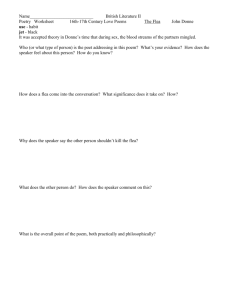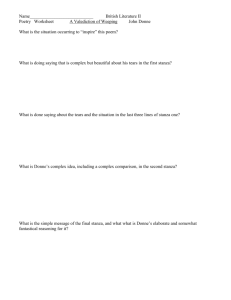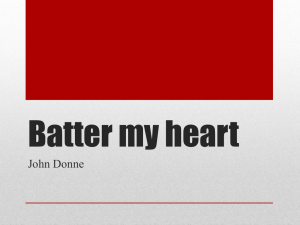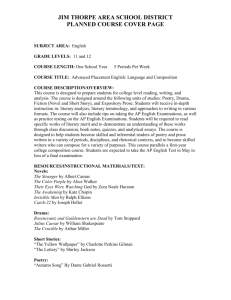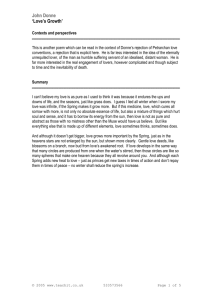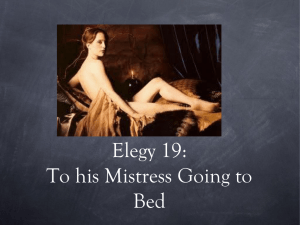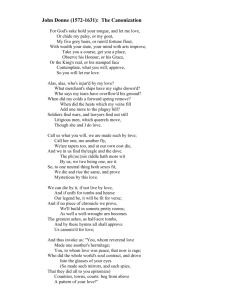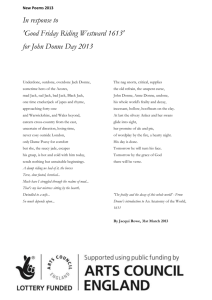Absent Voices in John Donne's Songs and Sonnets
advertisement
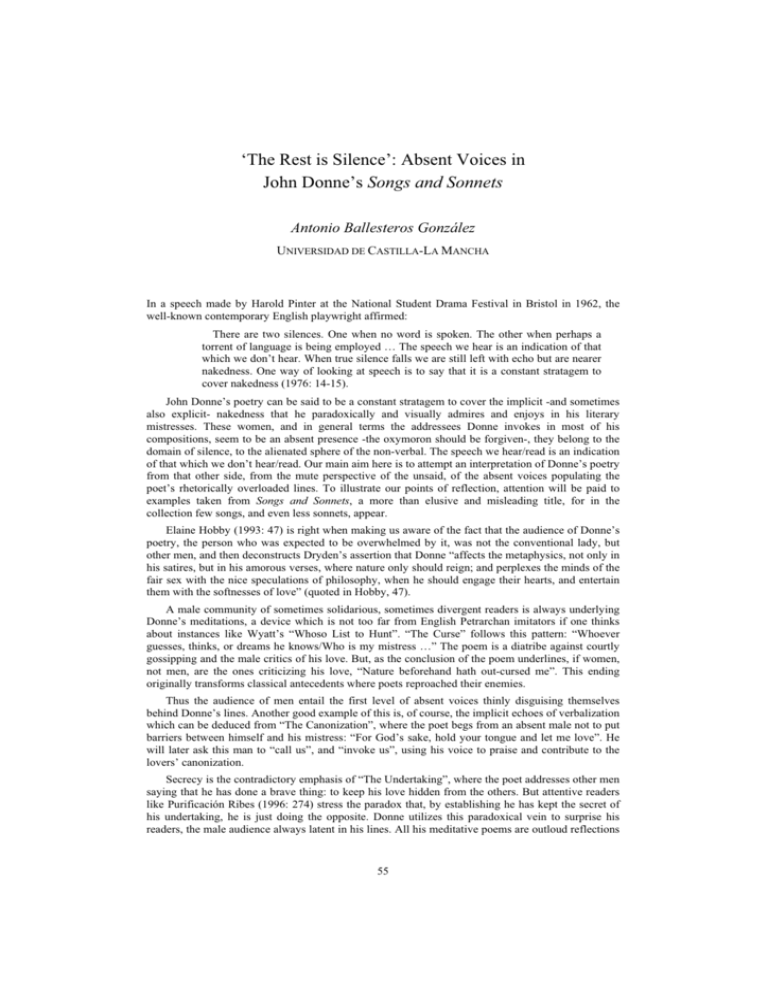
‘The Rest is Silence’: Absent Voices in John Donne’s Songs and Sonnets Antonio Ballesteros González UNIVERSIDAD DE CASTILLA-LA MANCHA In a speech made by Harold Pinter at the National Student Drama Festival in Bristol in 1962, the well-known contemporary English playwright affirmed: There are two silences. One when no word is spoken. The other when perhaps a torrent of language is being employed … The speech we hear is an indication of that which we don’t hear. When true silence falls we are still left with echo but are nearer nakedness. One way of looking at speech is to say that it is a constant stratagem to cover nakedness (1976: 14-15). John Donne’s poetry can be said to be a constant stratagem to cover the implicit -and sometimes also explicit- nakedness that he paradoxically and visually admires and enjoys in his literary mistresses. These women, and in general terms the addressees Donne invokes in most of his compositions, seem to be an absent presence -the oxymoron should be forgiven-, they belong to the domain of silence, to the alienated sphere of the non-verbal. The speech we hear/read is an indication of that which we don’t hear/read. Our main aim here is to attempt an interpretation of Donne’s poetry from that other side, from the mute perspective of the unsaid, of the absent voices populating the poet’s rhetorically overloaded lines. To illustrate our points of reflection, attention will be paid to examples taken from Songs and Sonnets, a more than elusive and misleading title, for in the collection few songs, and even less sonnets, appear. Elaine Hobby (1993: 47) is right when making us aware of the fact that the audience of Donne’s poetry, the person who was expected to be overwhelmed by it, was not the conventional lady, but other men, and then deconstructs Dryden’s assertion that Donne “affects the metaphysics, not only in his satires, but in his amorous verses, where nature only should reign; and perplexes the minds of the fair sex with the nice speculations of philosophy, when he should engage their hearts, and entertain them with the softnesses of love” (quoted in Hobby, 47). A male community of sometimes solidarious, sometimes divergent readers is always underlying Donne’s meditations, a device which is not too far from English Petrarchan imitators if one thinks about instances like Wyatt’s “Whoso List to Hunt”. “The Curse” follows this pattern: “Whoever guesses, thinks, or dreams he knows/Who is my mistress …” The poem is a diatribe against courtly gossipping and the male critics of his love. But, as the conclusion of the poem underlines, if women, not men, are the ones criticizing his love, “Nature beforehand hath out-cursed me”. This ending originally transforms classical antecedents where poets reproached their enemies. Thus the audience of men entail the first level of absent voices thinly disguising themselves behind Donne’s lines. Another good example of this is, of course, the implicit echoes of verbalization which can be deduced from “The Canonization”, where the poet begs from an absent male not to put barriers between himself and his mistress: “For God’s sake, hold your tongue and let me love”. He will later ask this man to “call us”, and “invoke us”, using his voice to praise and contribute to the lovers’ canonization. Secrecy is the contradictory emphasis of “The Undertaking”, where the poet addresses other men saying that he has done a brave thing: to keep his love hidden from the others. But attentive readers like Purificación Ribes (1996: 274) stress the paradox that, by establishing he has kept the secret of his undertaking, he is just doing the opposite. Donne utilizes this paradoxical vein to surprise his readers, the male audience always latent in his lines. All his meditative poems are outloud reflections 55 56 ANTONIO BALLESTEROS GONZÁLEZ for them to hear and learn. There are examples where the audience actually say things, arguments which are commonly refuted: Some that have deeper digg’d love’s mine than I, Say, where his centric happiness doth lie: I have lov’d, and got, and told, But should I love, get, tell, till I were old, I should not find that hidden mystery; O, ‘tis imposture all … (“Love’s Alchemy”; our emphasis). Another good illustration is “The Paradox”, in which the lover alluded is clearly representative of the male sex: No lover saith: “I love”, nor any other Can judge a perfect lover; He thinks that else none can, nor will agree That any loves but he: I cannot say I lov’d, for who can say He was killed yesterday? (our emphasis). Sometimes the speaker emphatically confines himself within the same gender category as his male readers, identifying with them in opposition to women: “Ah, cannot we,/ As well as cocks and lions, jocund be/ After such pleasures?” (“Farewell to Love”; our emphasis). On the other hand, there is a second perspective in order to approach Donne’s range of implied addressees, and then the main focus is on women. There can be little doubt about the fact that, as Elaine Hobby states, It is the silencing of the nightingale [Philomela], or of the abused woman that she can be seen to represent, that forms the final focus of this essay. One of the most marked features of male love poetry is the silence within it of the women it is supposedly addressed to: the woman is usually present as an object of desire, but not as a speaking subject (1993: 47). Donne is no exception to the rule: women’s voices are unheard, absent in most of his poetry. There floats a significant paradox: even though the male poetic “I” becomes a global “we” in many compositions, only his voice is perceived. Women are enclosed within the realm of Pinter’s first definition of silence, when no word is spoken. But, as the playwright says some paragraphs above, “So often, below the word spoken, is the thing known and unspoken”. Donne’s readers have a clear conscience of the implicit presence of his mistresses, for the poet gives us clues to understand how they behave. It is true that there are some glimpses of female speech, as in “Confined Love”, “Break of day” and “Self Love”. However, these are somewhat conventional poems, following on the whole Ovid’s influence as expressed by the Amores and the Ars Amandi, although with some original characteristics not devoid of sexual boldness (“Self Love”). But the interesting thing to notice is the performative role of the lady, who is a dynamic entity doing different tasks. In some occasions she is verbally and pragmatically compelled by the usually self-confident male speaker to carry out those “duties”. This is the case of “A Valediction: Of the Book”, where the poet, exerting his priorly assumed superiority and power, tells his mistress to read their letters and then to write their authoritative records of mutual love. The relationship is apparently an epitome of sexual inequality, with the patriarchal man telling the submissive woman to fulfil his desires. Nevertheless, the act of writing itself and the celebration of amorous unity between the lovers create the expectation of equivalence. His mistress can be silent, but she has access to the written word, and that makes the difference in the context of sexual connections in the Renaissance. In the end, women in Donne’s poetry are not wholly submissive or attentive to male intellectual and physical superiority. More usual than not, the lady is rebellious and assertive, even from a sexual point of view. As Achsah Guibory puts it, Sederi VIII (1997) ABSENT VOICES IN JOHN DONNE 57 The speaker displays control, elegance, and power through verbal wit and argument, though the poem attributes an interesting independence and intelligence to the mistress who repeatedly frustrates his desire for conquest (1993: 127). In a universe where everything is subject to mutability and change, in the Heraclitean fashion of pánta rei, women are often inconstant and unfaithful, threatening man’s comfortability and status quo. The extended use of imperatives and the conative function of language from the part of the speaker brings about very little success in his permanent search for power and control in his love bonds with women. The continuous presence of rhetorical questions (that is to say, interrogations which are not to be answered by an explicit voice) underlines in many occasions the doubts and constant hesitation haunting the speaker’s mind. And much of his concern has to do with women he cannot fully understand. His revenge, as in “The Indifferent”, is poor relief, in spite of the tone of utter detachment and apparent coldness. The mask of verbal pyrotechnics and ingeniously colloquial eloquence -Pinter’s “torrent of words”- has frequently the counterpart of metaphorical nakedness and insatisfaction. There is a dichotomous tension impregnating Donne’s lines, a dual balance between desire and reality, between plenitude and perplexity. Donne’s most performative poem is “The Flea”. In it the reader can appreciate the witty, but illusory sexual expectations from the part of the speaker, a prioristically happy prospects which, were it not for the open ending leaving the reader in medias res, one could be tempted to think them never to be fulfilled, leading to physical and psychological frustration. Of course, this is the general impression after reading a carpe diem piece of literature: no matter how ingenously and beautifully the speaker gives rein to his overflowing word, the final result almost always points out to disappointment. This can be one of the reasons why male poets are reluctant to tell us the end of the affair in their literary exercises. Donne’s speaker in “The Flea” can be audacious and even disgusting, but the lady admits little possibility of being outwitted by this subtle wooer. The three dramatic moments vertebrating the composition -coinciding with its three stanzasconvey a tenacious tour de force in which the male speaker wants to convince his mistress into making love with him. The referent linguistically located between the “I” and the “you” is the nasty flea, the object of attention of an obviously despairing lover, fed up with his lady’s disdain and unwillingness. The first stanza is expository, and contains the speaker’s conative attempt at persuading the lady into having physical intercourse with him through his amazing argument. But there is a perceptible change in the context surrounding the second stanza: his mistress is shown to have tried and put an ending to the uncomfortable situation by killing the insect. However, the speaker stops her with another clever outburst of rhetoric. The lady does not express her feelings through language, but the reader can “see” her different reactions. The third stanza commences with the evidence of female power, and the supremacy of action over words: she has finally “murdered” the flea, thinking that with this act she is leaving his persistent suitor without further contention. She has “triumphed”, as the male lover says, asserting her predominance by means of the repulsive deed (the speaker’s voice deliberately stresses the fact that she has “purpled [her] nail, in blood of innocence”). There is a rapid and ingenious counterattack from the part of the addresser, but when more solid “reasoning” -although based on false premises- has not convinced the lady, it is difficult to believe that he is going to persuade her with this last peculiar effort (I am conscious that this may be just a personal impression, though). In short, this interrupted dialogue dealing with the carpe diem convention in a totally original way leaves open -together with many other literary examples of the same period all over Europe- the uneasiness and mixed feelings with which Renaissance man coped with women. Donne’s poetry lives on paradox, but it seems to be clear that it manifests great preoccupation with subjects -like sexual relationships- which he and other poets perceived as extremely contradictory. Patriarchy may have possession of the written word, but this unstable balance is broken whenever an assertive lady exerts her performative powers at best, either through her promiscuity and inconstancy or through her resistance to surrender to the imperative orders and rules imposed by men. The traditional bearer of the written and spoken word not always wins in the usually deaf struggle to seize permanent control. It is otherwise little surprise that, in the few examples in which Donne collects female voices in his poetry, the poet subliminally expresses his fantasies of desire in the Ovidian vein, introducing a Sederi VIII (1997) 58 ANTONIO BALLESTEROS GONZÁLEZ glamorous woman who insists in her right to maintain sexual intercourse with any man she likes. “Self Love” goes even further with its climatic conclusion, where masturbation is suggested: Is there then no kind of men Whom I may freely prove? I will vent that humour then In mine own self love. But women writings of the Renaissance period are commonly devoid of this Ovidian explicitness in sexual terms. Apart from the implied male audience and the female presence, mostly as an object of desire, there are some other less semantically rich silenced voices in Donne’s Songs and Sonnets. The speaker sometimes addresses Love (always written with the capital letter) as a kind of classical deity which has disillusioned him. It is a conventional use of the device to be traced back in all the poetic fashions from Latin poets onwards. Although some Roman writers -prototipically Ovid- had described the dialogue between the speaker and Love, Donne never mentions Love’s answer, creating thus the impression of interrupted debate that is so frequent in his poems. Love, which epitomizes deception and fraud, is not given the possibility of defending himself. It is an indignity for the speaker that a masculine force becomes the perfect ally for the “enemy”, women. One of the best examples of the poetic voice’s invocation to Love is “The Will”: Before I sigh my last gasp, let me breathe, Great Love, some legacies: Here I bequeath Mine eyes to Argus, if mine eyes can see, If they be blind, then, Love, I give them thee; My tongue to Fame; to ambassadors mine ears; To women or the sea, my tears: Thou, Love, hast taught me heretofore By making me serve her who had twenty more, That I should give to none but such as had too much /before. There are other miscellaneous addressees in Donne’s Songs and Sonnets. An interesting illustration is the one provided by the motif of the jet ring, a frequent token of love between the suitor and his mistress (“A Jet Ring Sent”). The constant referent in this poem is the fickle lady, and the speaker invests himself with the mask of the melancholy lover (“Thou art not so black as my heart,/ Nor half so brittle as her heart, thou art”). The curious feature is that the abandoned addresser reconstructs the metaphorical speech of the object, which epitomizes the disastrous link between the male voice and his beloved: “I’m cheap, and naught but fashion, fling me away”. More conventional are those compositions where the speaker invokes the emblematic connotations of flowers (“The Blossom”, “The Primrose”). On the other hand, one of the best poems ever composed by John Donne is “The Sun Rising”, where the poet begins by imitating both Ovid’s well-known lines in Amores, 1, I, xiii (Quo properas, Aurora … Quo propera, ingrata viris, ingrata puellis) and the French Medieval aube songs, soon to acquire highly original and provocative nuances. The tone used by Donne is extremely powerful (“Busy old fool, unruly Sun,/ Why dost thou thus,/ Through windows, and through curtains, call on us?”), and the inexorable star attends to the speaker’s severe rebukes with impotent attitude, without making his voice explicit. The context of the poem centres itself upon the “torrent of words” from the part of the male lover, and the quiet presence of his mistress in bed, alien to the rhetorical outburst of her beloved. The situation is reversed in “Break of Day”, where the reader can follow the lady’s meditations, expressing her reflections upon the incompatibility between love and a much too busy man. Before reaching the conclusion, some brief words should be devoted to the extension of our arguments to other exponents of Donne’s poetic production. The “Holy Sonnets” will serve the purpose of exemplifying how the narcissistic features of the speaker conceal other voices, even Sederi VIII (1997) ABSENT VOICES IN JOHN DONNE 59 though the faculty of speech which is blurred is that of God himself. The speaker gives rein to his religious doubts using in many occasions the same poetic conventions and rhetorical devices as the reader can find in Donne’s secular poems. God is always an absent presence which is thinly manifested throughout the questions, syllogisms, hesitations, and dialogic inferences veiling divine reactions. It goes without saying that God’s silence is often the source of inner tensions within the speaker’s soul. This dramatic struggle could be the point of departure of further contention from the perspective of the role played by silence, which would deserve more critical prominence than we can provide here. I began this paper by quoting Harold Pinter’s ideas, and it would not be incongruous to put an end to it by citing the great playwright again: … I think that we communicate only too well, in our silence, in what is unsaid, and that what takes place is a continual evasion, desperate rearguard attempts to keep ourselves to ourselves. Communication is too alarming. To enter into someone else’s life is too frightening. To disclose to others the poverty within us is too fearsome a possibility (1976: 15). These last thoughts could also be applied to Donne’s speaker (using that other form of silence which is the rhetorical “torrent of words”) and his addressees (representatives of absent voices) in the Songs and Sonnets, for they all evince the essential loneliness of human beings. And the rest is silence. WORKS CITED: Donne, John 1996. Canciones y sonetos. Bilingual ed. Purificación Ribes. Madrid, Cátedra. -- 1991. The Complete English Poems. Intro., notes and ed. David Campbell. London, Everyman’s Library. Guibbory, Achsah 1993. “John Donne”, in The Cambridge Companion to English Poetry: Donne to Marvell. Ed. Thomas N. Corns. Cambridge, C.U.P. Hobby, Elaine 1993. “The Politics of Gender”, in The Cambridge Companion to English Poetry: Donne to Marvell. Ed. Thomas N. Corns. Cambridge, C.U.P. Pinter, Harold 1976. “Writing for the Theatre”, in Pinter. Plays: One. London, Methuen. *** Sederi VIII (1997)
